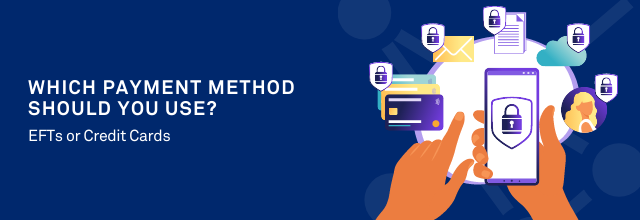If there was any doubt about how common electronic funds transfers (EFTs) and credit cards have become for Canadian businesses, a recent Payments Canada report put it to rest. In 2020, EFTs made up 25% of total business payment value in this country, while credit cards accounted for 24%.
That credit card number in particular was unheard of just five years previous. But as that Payments Canada report suggests, there have been four key drivers of credit card usage among businesses recently: payment acceptance, rewards, perceived convenience, and easier control of payments.
Those businesses aren’t wrong; there are upsides to using credit cards for both payors and payees. But they come at big costs — literally. And when weighed against the benefits of using EFTs instead, they may not be worth it for many Canadian businesses.
The true cost of credit cards
Few things come for free, and that’s especially true for credit card payments in Canada.
At 1.4%, Canadian merchants pay some of the highest credit card interchange fees in the world. This fee is charged on every credit card transaction and goes directly to the card-issuing bank. In 2015, Canadian banks raked in $5 billion in interchange fees. In 2019, they took in $9 billion. During the pandemic, that number likely went even higher as e-commerce platforms took off.
Interchange fees aren’t the only charges businesses have to pay when accepting credit cards. There can be assessment fees, processor markup fees, terminal fees, payment gateway fees, PCI fees, and incidental fees. All of them are borne by the business, and most undoubtedly get passed on to the payee.
When you consider that some of these fees fund rewards programs, the question has to be asked: are those rewards really worth the extra costs payors and payees have to bear?
Why EFTs?
With EFTs, the fees are a fraction of what they are for credit cards. Take those that Telpay charges. Payments to billers, government, and individuals are $0.60 per transaction. Plus, you can collect recurring payments from your customer with pre-authorized debits for $7.50 for up to 30 transactions and each additional payment is $0.25.
Still, credit card proponents argue that high interchange fees are worth it for benefits like instantaneous transactions. But for businesses making simple bill payments or suppliers accepting those payments, is instantaneous really worth the cost? Or is a next-day EFT solution, such as Telpay, a better option to process timely, efficient, and affordable payments?
Another upside to an EFT system like Telpay’s is payment consolidation for payees. Each day, every payment made to a supplier’s bank account is rolled into a single deposit. This makes for simple reconciliation, and suppliers have told us that it’s a big reason they prefer direct deposits from Telpay.
Payors get that convenience with Telpay too. With remote email authorization, for example, payments can be approved from anywhere. And because Telpay integrates with all of the leading accounting and payroll software, efficiency is a cinch.
As common as credit cards are becoming for businesses, the numbers don’t tell the whole tale. Whether you’re a payor or payee, you have to ask: are those credit card fees worth the advertised speed and convenience? Or is an EFT solution like Telpay’s just what you need to process timely, efficient, and affordable payments?
Find out how Telpay can streamline your payments process by calling us at 1-800-665-0302 or emailing us at sales@telpay.ca.

